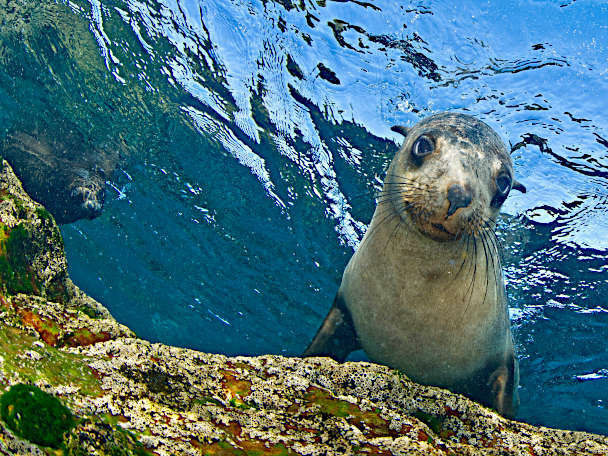Salmon companies target protected fur seals with more than 2400 underwater explosions

The Tasmanian salmon industry used more than 2400 underwater explosives against seals in the last quarter, with Huon Aquaculture reporting the death of two seals on its leases.
Department of Natural Resources and Environment data disclosed to Tasmanian Inquirer under Right to Information (RTI) laws show Huon Aquaculture used 1887 underwater explosives against seals at its salmon farms in the three months to the end of June, a rate of more than 20 a day.
The company’s use of the devices increased in the last quarter compared to the previous 15 months. It has used more than 10,600 underwater explosives against seals since January 2021.
Huon Aquaculture also accounts for 20 of the 25 seal deaths reported by the salmon industry since January 2021.
Despite accounting for the bulk of the explosives used, the most recent data indicates that in the last half of 2021, Huon Aquaculture produced just over one-third of the salmon grown in the state. The company has been owned by the Brazilian meat corporation, JBS, since November.
The company said it used more underwater explosives than its competitors because about two-thirds of its salmon is produced at offshore sites where seals are more prevalent. They include Storm Bay, off Bruny Island.
The company claimed in 2016 that its move into offshore waters was made possible by the development of double-walled “fortress pens” designed “to keep seals out and our fish in”.
Pene Snashall, Huon’s corporate communications and community relations manager, this month said seals often used the entry platform as a resting spot, but “structural changes” to the pen walkways and netting in the past few months had “reduced interactions”.
“We want to minimise any breaches of the nets to protect the seals, our fish and our staff. No one likes trying to cajole a 450kg male bull seal into leaving a treasure trove of food,” she said.
Fur seals are protected in Tasmania after being hunted to near extinction last century. The department said it permitted salmon companies to use various devices “to deter fur seals from presenting an unacceptable risk to marine farm staff or interfering with marine farming infrastructure or operations”.
The underwater explosives, called ‘seal crackers’ in the industry, produce a loud noise and a flash of light. The salmon industry has used more than 134,000 explosive devices in Tasmanian waters since 2016.
“After the cracker went off, the seal surfaced. The seal was showing lots of blood and blowing a lot of bubbles before sinking and [was] not sighted again.”
Tassal report, August 2018.
While explosives are intended to scare seals away from salmon pens, they can have a deadly effect. A Tassal report on the death of a seal in August 2018, made public after an RTI request by Environment Tasmania, described a cracker being thrown outside a pen five metres from a seal. “After the cracker went off, the seal surfaced. The seal was showing lots of blood and blowing a lot of bubbles before sinking and [was] not sighted again,” the report said.
Tassal cuts explosive use but increases ‘bean bag’ rounds
Tassal, the state’s largest salmon producer, almost halved the number of underwater explosives used in the last quarter compared to the preceding 15 months. However, the company remains the only salmon producer to continue to use “bean bag rounds”, fabric-coated plastic shells containing lead shot, against seals. The company fired 70 bean bag rounds at seals in the last quarter.
Tassal did not respond to questions about the significant decline in its use of explosive devices or its increased use of bean bag rounds.
“Around the world, the public is horrified when they discover that salmon companies are allowed to shoot seals. In Tasmania, two out of three companies don’t use bean bag rounds, so there is no reason we shouldn’t outlaw the practice here,” said Jessica Coughlan, from Neighbours of Fish Farms.
“With the recent acquisition of Tassal, Cooke Aquaculture is on notice that the public will not accept increases in animal cruelty in Tasmanian waters.”
Petuna, the smallest of the three salmon companies, reduced its use of underwater explosives by more than 10 per cent in the last quarter.
Rebecca Howarth, marine campaigner with the conservation group Environment Tasmania, welcomed Tassal and Petuna “responding to community pressure” by reducing their use of underwater explosives. “But seals are still being harmed with Huon Aquaculture increasing their use of crackers’ and Tassal increasing their use of lead projectile beanbags,” she said.
A recently released Legislative Council Fin Fish Farming in Tasmania Inquiry Report recommended a review of the department’s seal management framework, “including the efficacy and safety of all seal management devices” The government responded by saying it planned a new aquaculture standard for wildlife interactions to replace the framework.
Howarth supported the recommendation. “There is a need for a full investigation into all seal deterrents and the harm they cause,” she said.
A discussion paper on the government’s proposed 10-year salmon plan says the industry needs to “effectively avoid and manage interactions with seals and other wildlife”, but provides no analysis of current trends or proposals for change. Submissions on the proposed plan close on August 24.
 @BobBurtonoz
@BobBurtonoz